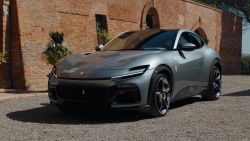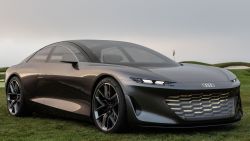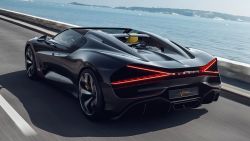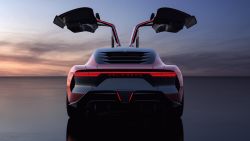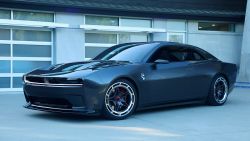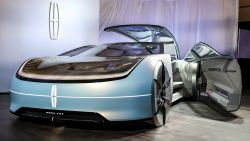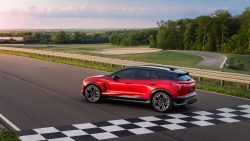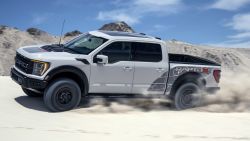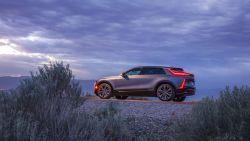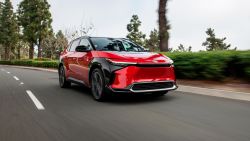General Motors unveiled its new GMC Yukon Tuesday and, no surprise, it looks very similar to the Chevrolet Tahoe revealed just a few weeks ago. Yes, the grill and taillights look different. But, if you saw it from the side, it would be nearly impossible to tell it apart from the Tahoe.
The two SUVs will be built on the same assembly line in Texas and will share a large majority of the same engineering. In fact, every GMC model is very similar to a truck or SUV available at a Chevrolet dealer. This raises a question often asked about General Motors’ GMC brand. What’s the point?

Simply put, GM makes more money from its GMC trucks and SUVs than from its Chevrolet counterparts because GMC customers are willing to spend more on their vehicles. Last year, buyers paid an average of about $8,500 more for a GMC Yukon than for a Chevrolet Tahoe, according to data from Cox Automotive. Buyers paid about $7,000 more for GMC Sierra full-size pickups than for Chevrolet Silverados.
Those differences in price come from a number of factors, including slightly higher sticker prices and the number and cost of the options customers choose to add. Basically, GMC buyers tend to dress up their trucks much more often.
GMC is not Mercedes-Benz or BMW. It is not a luxury brand in any traditional sense. For over a century, it has been a nothing-but-trucks brand and that lends GMC a certain aura.
“GMC has marketed itself pretty successfully as the rugged, more premium brand relative to Chevy,” said Timothy Fleming, head of forecasting at Cox Automotive.
It also helps that GMC just happens to be a purely truck and SUV brand at a time when the market is shifting hard away from cars, added Fleming.
A history of trucks
GM (GM)C traces its roots to the early 1900s when William Durant was just cobbling together his new company, General Motors. GM (GM) had already purchased a number of relatively small car makers, including Buick, Oldsmobile, and Oakland.
What Durant’s new motor vehicle behemoth didn’t have yet was a truck brand. So Durant bought two truck makers, Rapid Motor Vehicle and Reliance Motor Car, and a few other truck makers after that. In 1911, they were all combined into the General Motors Truck Company, shortened down to just GMC for marketing purposes. Later on, GM started selling trucks under its Chevrolet brand as well. Most of the time, they were pretty much the same trucks with slight cosmetic changes.
In recent years, GM has done more to differentiate its GMC models from Chevrolets. Most people probably can’t see that a GMC Terrain is basically the same under the hood as a Chevrolet Equinox. They look nothing alike. GM also now makes certain features available only on GMC products, like the carbon fiber bed option on the GMC Sierra pickup. You can’t get that, or the MultiPro tailgate that has foldout extensions to make a little workbench or steps, on a Chevrolet Silverado.

The new 2021 Yukon also offers a few “GMC exclusive” features not available on the Chevrolet Tahoe, such as an electronic limited-slip differential that helps the wheels gain better traction in off-road situations.
The single biggest innovation that has helped boost GMC revenues has been the Denali sub-brand that marks the most richly appointed GMCs. Named after the tallest mountain in North America, also called Mount McKinley, the Denali brand first appeared on top-of-the-line GMC Yukons in the late 1990s. Customers quickly embraced the name.
Today, 60% of all GMC Yukons sold are Denalis, with sticker prices topping $70,000. That’s at least $20,000 more than the cheapest Yukons.
The GMC Yukon Denali is rather like GM’s closely related Cadillac Escalade, but it attracts a different sort of customer, said Cox Automotive’s Fleming.
“It’s a more understated look,” he said, “still very premium and upscale, but not as flashy as a Cadillac.”

Across all GMC models, the Denali versions, including the small Terrain Denali and the bigger Acadia Denali crossover, make up nearly a third of all GMC trucks and SUVs sold. They sell for an average price of about $56,000, said Duncan Aldred, GM’s vice president for Buick and GMC sales. That average price is higher than the average purchase price for any of the top German luxury car brands, Aldred boasted. And GMC’s Denali brand sold more units last year than many of the smaller luxury car bands, like Lincoln or Volvo.
“So when you get that kind of volume with a price that exceeds all of what we consider [top] luxury brands, you can see that it’s a very successful and very important part of our business,” Aldred said.
In the new Yukon, designers have given the Denali an interior that’s completely different from that in other Yukons. It doesn’t just offer different colors and open-pore (rather than heavily varnished) wood trim, but the dashboard and other surfaces are shaped differently. This new Yukon GMC, including the Denali version, will go on sale this summer. GM has yet to disclose pricing for any of the new models.

GMC has recently been introducing an alternative to the Denali for those who want a more rugged, off-road look. GMC AT4 models, currently available as Sierra pickups and Acadia large crossovers, have distinct grills, more rugged tires and unique front-end designs shaped to clear obstacles off-road.
GMC also unveiled an AT4 version of the new Yukon. GMC’s current AT4 models are about $4,000 less expensive than Denalis, giving buyers a cheaper way to get a distinctive custom truck look. It’s proven a good way for GMC to take customers away from other automakers, said Aldred, including those who might not have bought a different GM product.
“The reason we try and create strong brands is because they need to mean different things to different people,” Aldred told CNN Business. “They need to attract people in different ways. And establishing GMC as the premium SUV and truck brand, that attracts different customers and they want a GMC.”



